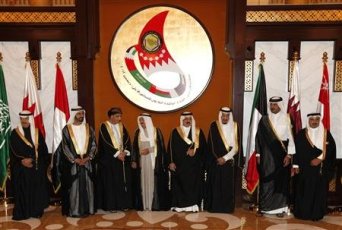Sudan absent from communiqué issued by Arab Gulf leaders at GCC summit
December 25, 2012 (WASHINGTON) – The final communiqué issued today by the leaders of six Arab Gulf states omitted any mention of Sudan in what an analyst said could signal growing displeasure over Khartoum’s ties with Tehran.
 This is the first time since 2005 that the Gulf Cooperation Council (GCC) drops any reference to the situation in Sudan in its annual summits.
This is the first time since 2005 that the Gulf Cooperation Council (GCC) drops any reference to the situation in Sudan in its annual summits.
The GCC includes Bahrain, Kuwait, Oman, Qatar, Saudi Arabia and the United Arab Emirates (UAE).
For years the GCC countries traditionally had the final communiqué include their joint position on the Darfur conflict and peace talks hosted by Qatar or Sudan’s relations with the newly established state of South Sudan.
But in recent months there has been mounting signs of tensions between Sudan and Saudi Arabia which wields the greatest influence in the GCC by account of its size and oil wealth.
Since October the Sudanese government has twice allowed Iranian navy warships to dock in Port Sudan which lies just across the Red Sea from Saudi Arabia.
The visit has caused split even within the circles of the Sudanese government and National Congress Party (NCP) and the country’s foreign minister Ali Karti has publicly warned of its impact on Khartoum’s ties with Arab Gulf states.
“I am not saying we want to antagonize Iran but there is an opportunity for continuing relations with Iran to the extent that convinces the Arab Gulf states that these ties are not against its interests,” Karti said in a TV interview earlier last month.
“I know that our relations with Iran do not hurt the [Arab] Gulf [states]…but some of our actions [such as] refraining from explaining these issues [to the Gulf]. The issue of Iranian ships was one of them.” Karti added.
The top Sudanese diplomat disclosed that he opposed receiving the Iranian warships and said that he made his views known to the government. Only once did Khartoum act on his recommendations by turning down an Iranian naval stop last February.
Karti acknowledged that his position on Iranian vessels stems out of concern over possible backlash by Arab Gulf states.
Shi’ite power Iran sees the pre-dominantly Sunni Gulf as its own backyard and believes it has a legitimate interest in expanding its influence there. Arab Gulf states say that Iran is stoking tensions by inciting Shi’ite populations in Bahrain.
The GCC communiqué today contained strong language condemning what they described as Iranian interference in the region.
“The council expressed its rejection and condemnation of the continuing Iranian interference in the affairs of the Gulf Cooperation Council’s states and called on Iran to stop these policies,” the text reads.
A political analyst in Khartoum who asked not to be named said he sees the removal of Sudan from the GCC’s agenda this year and condemnation of Iran as two connected issues.
“It is very clear. They are telling the Sudanese government that as long as you are friends with Iran then you no longer deserve our attention,” the analyst told Sudan Tribune.
“The question is whether Sudan will get the message and starts acting accordingly….At a time of economic distress Khartoum needs to be in good terms with the Gulf [states] rather than Iran,” he added.
None of the GCC countries have made any public comments on the relations between Tehran and Khartoum or the visits by the Iranian navy.
But last month a diplomatic source told Sudan Tribune that Sudan’s spy chief Mohamed Atta held talks with his Saudi counterpart Bandar Bin Sultan who criticized Khartoum for “being too close to Iran”.
In the same month the Saudi pro-government Al-Riyadh newspaper in an editorial titled
“The fall of masks between Iran and Sudan” blasted Khartoum over the Iranian warships saying there is no “logical justification” for relationship between the two countries.
“Bashir’s government resorting to a state that is in political and security odds with most Arab countries has no logical justification,” the newspaper said.
The Saudi government has been reluctant to assist Sudan financially despite pleas by
Sudanese officials including president Omer Hassan al-Bashir who held talks with King Abdullah last March.
Furthermore, no Saudi official met with Bashir during a private visit he made last month for medical treatment. Sudan state media at the time said that the Sudanese leader is scheduled to meet with his Saudi counterpart.
“Sudan needs to understand that this visit will not be accepted by Saudi Arabia,” said Khalid al-Dakhil, a Saudi political analyst told Reuters this month.
Gulf states are among the biggest investors in the country and have just funded a large sugar plant and Sudan’s only shopping mall. Diplomats told Reuters that Sudan’s central bank has toured the Gulf several times, trying to drum up support for more funding.
Sudan is reeling under the impact of the economic shock that resulted from the south’s secession including soaring inflation rate, rising prices and chronic shortages in foreign currency supply.
(ST)
